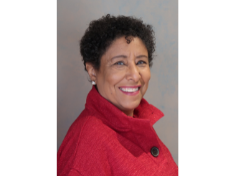-
A Conversation with Dr. Nahid Toubia: Bodily Autonomy and the 2021 State of World Population Report
 Bodily autonomy is something almost innate in us, and yet also a Eureka moment for many people, says Dr. Nahid Toubia, Director for the Institute of Reproductive Health and Rights in Sudan on this week’s episode of Friday Podcasts. “Every human being really has the right to own their body, to own their decisions, to own their choices regarding their life, their futures, how they want to live, who they want to partner, whether they want to have children or not, what kind of families they want to have,” she says. “So, all of these choices are all wrapped up in this concept of body autonomy.”
Bodily autonomy is something almost innate in us, and yet also a Eureka moment for many people, says Dr. Nahid Toubia, Director for the Institute of Reproductive Health and Rights in Sudan on this week’s episode of Friday Podcasts. “Every human being really has the right to own their body, to own their decisions, to own their choices regarding their life, their futures, how they want to live, who they want to partner, whether they want to have children or not, what kind of families they want to have,” she says. “So, all of these choices are all wrapped up in this concept of body autonomy.”Bodily autonomy is something almost innate in us, and yet also a Eureka moment for many people, says Dr. Nahid Toubia, Director for the Institute of Reproductive Health and Rights in Sudan on this week’s episode of Friday Podcasts. “Every human being really has the right to own their body, to own their decisions, to own their choices regarding their life, their futures, how they want to live, who they want to partner, whether they want to have children or not, what kind of families they want to have,” she says. “So, all of these choices are all wrapped up in this concept of body autonomy.”
While some view bodily autonomy as a “luxury issue,” or secondary to other essential issues such as nutrition, housing, political participation, and poverty, “[bodily autonomy] actually is the basis for all these other issues that we want to get at,” says Dr. Toubia. Women cannot get an education or participate in the economy if somebody else controls their body, she says. Without bodily autonomy, “everything else is not going to happen.”
While women need allies, they must speak for themselves.
For Dr. Toubia, discussing the complexities of female genital mutilation (FGM) in the 2021 State of the World Population report was monumental. “I really applaud UNFPA for the courage that they have produced this report and increasingly handling, you know, more what people see as peripheral or controversial issues,” says Dr. Toubia. “But it’s okay, somebody needs to push the envelope, as they say.” Other UN and U.S. agencies need to follow and a critical first step is to adopt the language of bodily autonomy into their guidelines, proposals, partnerships with local communities, and programs to make bodily autonomy something people truly understand, she says.
Dr. Toubia approaches FGM, one of the clearest attacks on bodily autonomy, from an “African feminist perspective.” While women need allies, they must speak for themselves, she says. “So one of the things we did very early and we still continue to do, even in a place like Sudan, is to bring forth the voice, number one, the first person who is important in this, the woman, herself, the girl who was cut.” When women are given a safe space to discuss this harm, they open up and speak about their experiences. “And that’s where change happens,” she says.
The language used to discuss these issues is also crucial, says Dr. Toubia. While sexual and reproductive health and rights (SRHR) is widely used and is instrumental in centering human rights in sexual and reproductive health, the term can be too complex for the average person to understand. SRHR provides an “umbrella” to demand broad systems-level change, whereas bodily autonomy is more immediate, centering on the individuals themselves. For that reason, she says “bodily autonomy is more understandable than sexual and reproductive health and rights.”
This linguistic shift has provided a newfound sense of agency, empowering people to voice and claim this most fundamental of rights, says Dr. Toubia. “And now suddenly there is a word, there is some language for it: I deserve to be autonomous. I deserve to own my body,” she says. “And I think that’s a huge, a huge step forward.”
Read More:
Child Marriage and Female Genital Mutilation Threaten Gender Equality
Bodily Autonomy is a Human Right Denied to Almost Half of Girls
COVID-19 Disrupts Essential Health Services, Leading to Millions of Unintended Pregnancies
Friday Podcasts are also available for download on iTunes and Google Podcasts.
Sources: UNFPA.
Photo Credit: Dr. Nahid Toubia, used with permission courtesy of Dr. Toubia.
 A Publication of the Stimson Center.
A Publication of the Stimson Center.




